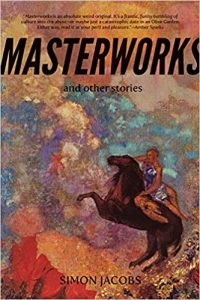Ian Mond Reviews Masterworks and Other Stories by Simon Jacobs
 Masterworks and Other Stories, Simon Jacobs (Instar Books 978-1682199053, $20.00, 208pp, hc) August 2019.
Masterworks and Other Stories, Simon Jacobs (Instar Books 978-1682199053, $20.00, 208pp, hc) August 2019.
Until recently, Simon Jacobs has enjoyed the coveted honour of being on the list of authors whose books I own but whom I’ve never read. I purchased his first novel, Palaces, more than a year ago because it looked right up my alley and, since then, it’s been collecting virtual dust on my Kindle app. Rather than rectify this by immediately reading Palaces, I’ve instead picked up Jacobs’ debut collection, Masterworks and Other Stories, because that’s how I roll.
The collection consists of six stories, though the first four barely get out of first gear before they’re over. Of those, “Let Me Take You to Olive Garden”, is the longest and, as such, provides an insight into Jacobs attitude toward fiction. The story is broken up into three sections that follow the same formulae. A couple meet at a restaurant, they have a conversation – sometimes awkward, sometimes loving, sometimes heated – and then the earth opens up underneath them, devouring the restaurant and the world around them. What’s immediately apparent is that Jacobs is not interested in spoon feeding the reader or providing clear sign-posts on how you should react. This is also the case with the next three pieces, vignettes that provide barely a glimpse into a world with little context or explanation.
The final two stories, “Masterworks” and “Land”, are far more substantial in length, though no less opaque. “Masterworks” is set in a dystopia of sorts, a city free of people where “the buildings in the distance are all in flames…. [a] rotten smell hovers in the smoky air, fruit gone fleshy.” Nell and Priam, somehow able to survive in this environment, spend their days reproducing famous works of art – a painting, a musical composition, an installation. The story is structured around these “masterworks,” each scene beginning with the title of the piece and the character – Priam or Nell – who will be re-enacting the work. It’s a terrific conceit that had me Google every masterwork that’s referenced (I’m sure a deliberate move on Jacobs’s part). As the narrative progresses, these re-creations become more elaborate and weird and even violent, eventually leading the couple to break up. Things go from strange to bizarre with the introduction of Priam’s father, Liam, a flood that threatens to drown the world; and the birth of Priam and Nell’s child, Morning, which involves a surreal trip back to what it appears to be our world sans burning buildings. “Masterworks” reveals itself to be a love story, almost in the Hollywood tradition – couple gets together, breaks apart, gets together again in the last third – but one with an excellent taste in, and deep appreciation of, art.
Novella-length “Land” initially takes place in a remote cabin where our narrator has been asked by his Landlord to babysit two huskies. The lake situated near the cabin turns out to be a gateway into a world shrouded in a perpetual night, where an obsidian keep looms over an empty cluster of houses. Our narrator enters the keep and discovers a white chamber with seven beings in golden robes sitting around a large table playing an inscrutable game. Alternating between this surreal journey into an alien environment are flashbacks to our narrator’s unhealthy relationship with his landlord. This involves the landlord dropping over unannounced to either take the narrator out for a meal, a joy ride in whatever new car he’s rented, or an errand to a new property the landlord has purchased. At the same time, the landlord seems unwilling to fix the leaking pipes in our narrator’s bathroom. These two very different narratives rubbing up against each other – switching from Lovecraft to Larry David – reminded me of Peter Straub’s more offbeat work, particularly The Buffalo Hunter. “Land” also displays Jacobs’s sense of humour, whether it’s that awkward time when the landlord popped over when the narrator was with a girl, or the miscommunication that occurs when the landlord’s single-minded, Turkish-speaking parents arrive to fix the bathroom.
The stories that comprise Masterworks and Other Stories might be uncanny, fragmentary, and avant-garde, but they’re never dull, off-putting, or pretentious. This is because Jacobs’s work is in tune with, and influenced by, an eclectic range of high and low culture – whether it’s Queen, or cosmic horror, or The Olive Garden, or the masterpieces of great artists – which ground his work in a reality that we can recognise. While Jacobs might be averse to info-dumping (a position I heartily endorse) and seems uninterested in providing neatly packaged endings, the quality of his prose, clear and precise, means that his fiction is always accessible. As much as I’m excited to see what Jacobs does next, it’s high time I blew off the virtual dust and read Palaces.
Ian Mond loves to talk about books. For eight years he co-hosted a book podcast, The Writer and the Critic, with Kirstyn McDermott. Recently he has revived his blog, The Hysterical Hamster, and is again posting mostly vulgar reviews on an eclectic range of literary and genre novels. You can also follow Ian on Twitter (@Mondyboy) or contact him at mondyboy74@gmail.com.
This review and more like it in the October 2019 issue of Locus.
 While you are here, please take a moment to support Locus with a one-time or recurring donation. We rely on reader donations to keep the magazine and site going, and would like to keep the site paywall free, but WE NEED YOUR FINANCIAL SUPPORT to continue quality coverage of the science fiction and fantasy field.
While you are here, please take a moment to support Locus with a one-time or recurring donation. We rely on reader donations to keep the magazine and site going, and would like to keep the site paywall free, but WE NEED YOUR FINANCIAL SUPPORT to continue quality coverage of the science fiction and fantasy field.





